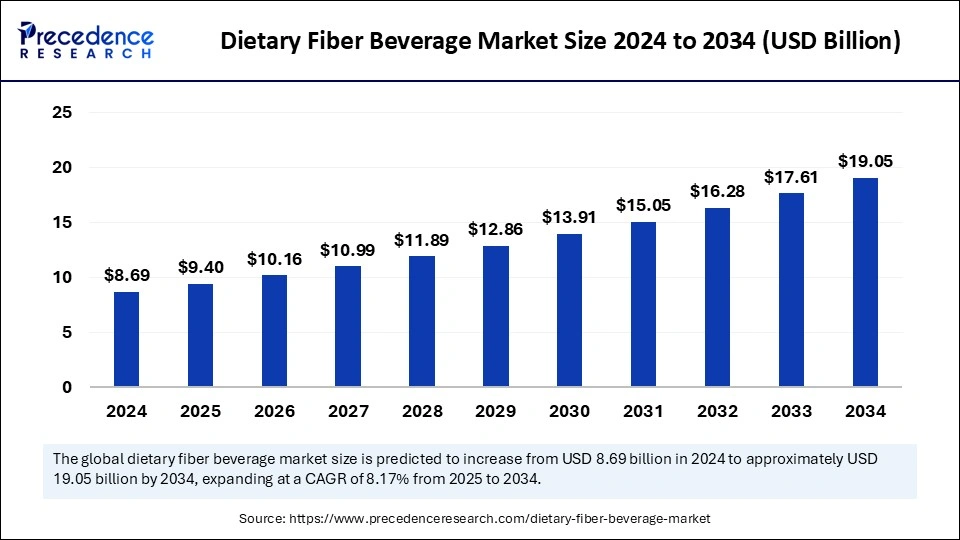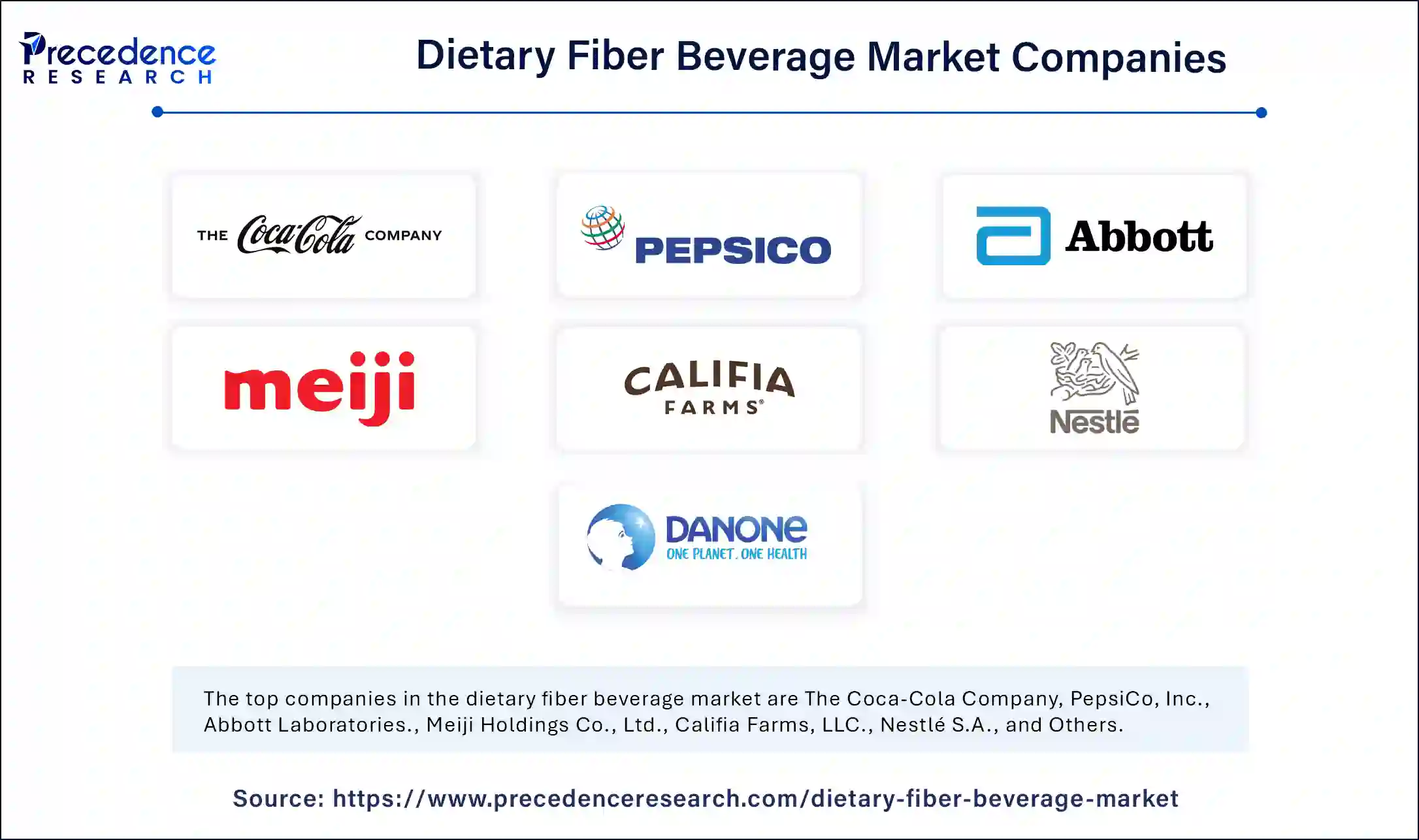The global dietary fiber beverage market size was valued at USD 8.69 billion in 2024 and is expected to attain around USD 19.05 billion by 2034, growing at a CAGR of 8.17%.

Get a Free Sample Copy of the Report@ https://www.precedenceresearch.com/sample/5743
Dietary Fiber Beverage Market Key Takeaways
-
North America secured the highest market share of 37% in 2024, leading the global industry.
-
The Asia Pacific market is expected to showcase notable growth in CAGR over the upcoming years.
-
The shakes/smoothies segment dominated the market, representing 52% of the total share in 2024.
-
The tea/coffee segment is forecasted to expand rapidly between 2025 and 2034.
-
The ready-to-drink segment retained the largest market share of 63% in 2024.
-
The ready-to-mix segment is poised for the fastest growth during the forecast period from 2025 to 2034.
-
The inulin fiber type contributed to the highest share of 41% in 2024.
-
The hypermarkets/supermarkets segment emerged as the leading distribution channel, holding 46% of the market share in 2024.
-
The online retail segment is anticipated to experience significant growth from 2025 to 2034.
Role of AI in the Dietary Fiber Beverage Market
Artificial intelligence is playing a transformative role in the dietary fiber beverage market by optimizing product development, enhancing supply chain efficiency, and improving consumer engagement. AI-powered analytics help beverage manufacturers analyze consumer preferences, dietary trends, and nutritional requirements, enabling the creation of fiber-rich beverages tailored to specific health needs. By leveraging machine learning algorithms, companies can identify emerging ingredients and formulations that enhance the taste, texture, and functional benefits of dietary fiber drinks.
AI is also improving supply chain management by predicting demand patterns and optimizing inventory levels, reducing waste and ensuring timely product availability. Smart manufacturing processes driven by AI enhance quality control by detecting inconsistencies in ingredient composition and maintaining consistency in taste and texture. Additionally, AI-driven personalization tools allow brands to recommend dietary fiber beverages based on consumers’ health goals, lifestyle, and purchasing behavior, improving customer satisfaction and brand loyalty. As AI continues to advance, its integration into the dietary fiber beverage industry will drive innovation, efficiency, and consumer-centric product development.
Dietary Fiber Beverage Market Growth Factors
The dietary fiber beverage market is experiencing significant growth due to increasing consumer awareness about digestive health, rising demand for functional beverages, and shifting preferences toward healthier lifestyles. Consumers are becoming more conscious of the benefits of dietary fiber, including improved digestion, weight management, and cardiovascular health. This growing awareness has led to a surge in demand for fiber-infused beverages, particularly among health-conscious individuals and fitness enthusiasts.
Another key factor driving market growth is the increasing prevalence of lifestyle-related diseases such as obesity, diabetes, and gastrointestinal disorders. As people seek preventive health solutions, dietary fiber beverages have emerged as a convenient and effective option. Additionally, advancements in food and beverage technology, such as the use of prebiotic and probiotic fibers, are enhancing the functional benefits of these drinks.
The expansion of online retail and e-commerce platforms has also made dietary fiber beverages more accessible, further fueling market growth. Moreover, innovations in flavors, formulations, and packaging are attracting a broader consumer base, including younger generations looking for tasty yet nutritious alternatives.
Dietary Fiber Beverage Market Overview
The dietary fiber beverage market is expanding globally, fueled by growing consumer awareness of digestive health and the benefits of fiber-rich diets. As lifestyles become more fast-paced, consumers are looking for convenient ways to meet their daily fiber intake, making fiber-infused drinks a preferred choice. These beverages are gaining popularity in various segments, including functional drinks, sports nutrition, and plant-based beverages. Continuous research and innovation in fiber extraction and beverage formulation are making these products more appealing to a wider audience.
Market Scope
| Report Coverage | Details |
| Market Size by 2034 | USD 19.05 Billion |
| Market Size in 2025 | USD 9.40 Billion |
| Market Size in 2024 | USD 8.69 Billion |
| Market Growth Rate from 2025 to 2034 | CAGR of 8.17% |
| Dominated Region | North America |
| Fastest Growing Market | Asia Pacific |
| Base Year | 2024 |
| Forecast Period | 2025 to 2034 |
| Segments Covered | Type, Form, Fiber Type, Distribution Channel, and Regions |
| Regions Covered | North America, Europe, Asia-Pacific, Latin America and Middle East & Africa |
Market Dynamics
Drivers
Key factors driving market growth include increasing concerns about obesity, digestive disorders, and chronic diseases such as diabetes. Consumers are opting for healthier beverage alternatives, leading to a surge in demand for fiber-rich drinks. The growing influence of social media and digital health trends has further educated consumers on the importance of dietary fiber. Additionally, the expansion of functional beverage categories, including probiotic and prebiotic drinks, has boosted the adoption of fiber-enriched beverages.
Opportunities
The development of innovative fiber sources, such as resistant starch, psyllium husk, and beta-glucans, presents new opportunities for product differentiation. The integration of AI and data analytics is also helping brands understand consumer preferences and personalize beverage recommendations. The shift toward sustainable and plant-based ingredients allows manufacturers to create eco-friendly fiber drinks that align with the clean-label movement. Furthermore, partnerships between beverage companies and health-tech firms are enhancing product development and market outreach.
Challenges
The dietary fiber beverage industry faces several challenges, including formulation difficulties, high production costs, and taste-related concerns. Many consumers associate fiber with a bland or gritty texture, which can be a barrier to widespread adoption. Additionally, sourcing high-quality fiber ingredients while maintaining affordability remains a challenge for manufacturers. Regulatory compliance and approvals for health claims further add complexity to product labeling and marketing.
Regional Insights
North America remains the dominant player in the dietary fiber beverage market due to high consumer demand for functional drinks and a well-established health and wellness industry. The Asia Pacific region is expected to grow rapidly, fueled by increasing disposable income, urbanization, and rising health consciousness in countries like China, India, and Japan. Europe is witnessing steady market growth, particularly in the natural and organic beverage segment. Meanwhile, Latin America and the Middle East are beginning to embrace fiber-rich beverages as dietary habits evolve.
Dietary Fiber Beverage Market Companies

- The Coca-Cola Company
- PepsiCo, Inc.
- Abbott Laboratories.
- Meiji Holdings Co., Ltd.
- Califia Farms, LLC.
- Nestlé S.A.
- Danone S.A
Announcement by the Industry Players
- In September 2024, ZBiotics launched a Sugar-to-Fiber Probiotic Drink Mix to enhance gut health. Montana State University Professor Seth Walk, PhD, MS, stated, “The microbiome has been studied for hundreds of years, but we are now discovering its full potential in managing human health. ZBiotics is developing new and augmenting standing microbiome functions that scientists believe will improve human health. This is a very different approach than other companies in this space seeking to supply one organism for the masses.”
Recent Developments
- In February 2025, Oobli partnered with Ingredion to expand access to sweet proteins, a healthier sugar alternative for food and beverages.
In September 2024, ZBiotics launched Sugar-to-Fiber Probiotic Drink Mix, a genetically engineered probiotic that converts dietary sugar into prebiotic fiber to address fiber insufficiency in the American diet.
Segments Covered in the Report
By Type
- Shakes/Smoothies
- Tea/Coffee
- Carbonated Drinks
- Others
By Form
- Ready to Drink (RTD)
- Ready to Mix (RTM)
By Fiber Type
- Inulin
- FOS
- GOS
- Others
By Distribution Channel
- Hypermarkets/Supermarkets
- Convenience Stores
- Online Retails
- Specialty Stores
- Pharmacies
- Others
By Region
- North America
- Europe
- Asia-Pacific
- Latin America
- Middle East & Africa
Also Read: Cooling Fabrics Market
Ready for more? Dive into the full experience on our website@ https://www.precedenceresearch.com/
- Perishable Prepared Food Market Size to Attain USD 157.77 Bn by 2034 - April 24, 2025
- Fabric Filter Market Size to Attain USD 7.50 Billion by 2034 - April 24, 2025
- Pilot Training Market Size to Attain USD 31.38 Bn by 2034 - April 24, 2025
